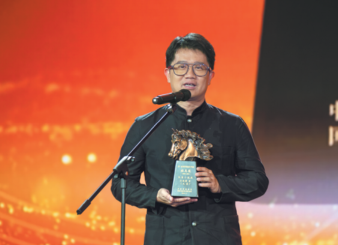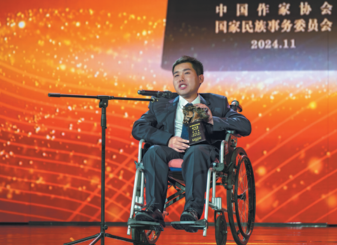Ethnic literature awards celebrate national diversity

Should the topic of wheelchair-bound Chinese writers come up, Shi Tiesheng is usually the first to be mentioned. Despite his disability, the strength conveyed in his words is profoundly moving. Today, the emergence of Ma Jun, who writes under the pen name of Liu Kexing, has introduced a new wheelchair-bound writer to the public, one who shares his touching story, much like Shi.
Born in 1995, Ma is the youngest laureate this year for the Junma Awards for Ethnic Literature in the prose category. Disabled since birth, and severely shortsighted, Ma has faced immense challenges throughout his life and although he was admitted to university at 21, his health prevented him from enrolling.
As he struggled with pain, he found solace in Shi's work, particularly his acclaimed book Wo Yu Ditan (The Temple of Earth and Me). Inspired, Ma embarked on his own literary journey, pouring his experience into his writing. His award-winning book, Qing Bai Shijie (The Green and White Stone Steps), captures the complexities of life through the lens of his personal struggles.
"In the world of literature, I stood up," Ma said in a video played at the award ceremony. "Shi Tiesheng illuminated my path, and I hope to be a light for others."
Held at the Nanning International Convention and Exhibition Center in the Guangxi Zhuang autonomous region on Nov 16, and hosted by the China Writers Association, the 2024 China Literature Gala: Junma Awards Night, celebrated the achievements of ethnic literature. In all, 25 works of literature and five translators were recognized.
Among the winners was Ma Boyong, whose 2022 novel Da Yi (The Great Doctor), an exploration of modern Chinese medicine, won in the novel category.
"This is the first time I've chosen modern Chinese history as a central theme, particularly the evolution of Chinese medical care. During my research, I found inspiring stories about the first generation of philanthropic doctors. They were the pioneers, and their work deserves to be remembered, introduced to readers in a way that resonates," Ma Boyong said, reflecting on his book.
He then spoke of his personal connection to the Guangxi Zhuang autonomous region.
Although he was born in the Inner Mongolia autonomous region, Ma Boyong grew up in Guilin, a famous tourist city in the region, and his time there left an indelible mark. "I'm not visiting here, I'm returning home," he said.
"As an ethnic writer, I believe every group has its own uniqueness, but we are all part of the larger Chinese identity. It's within this shared memory that we find unity. By exploring our collective history, we can uncover a powerful source of strength," he added.
This year's Junma Awards welcomed Mo Yan, Nobel laureate in literature, as presidium member. Mo Yan praised Guangxi's literary contributions, emphasizing the deep influence of its culture on the national literary landscape.
"This land has nurtured its people like oysters making pearls, turning life's hardships and joys into luminous treasures. Their songs and emotions transform into stories, which in turn become a source of beauty," Mo Yan said. He also highlighted the growing role of Guangxi writers in enriching the diversity of Chinese literature.
The celebration extended beyond the awards themselves. With its beautiful landscapes and mild weather, Nanning was an ideal backdrop for the event. Writers and attendees enjoyed the city and all it offered, with many noting how the vibrant environment was not only comfortable, but also sparked creativity.
Award-winning author representatives took turns giving heartfelt acceptance speeches, which were followed by performances by ethnic artists.
Established in 1981, the Junma Awards for Ethnic Literature is held every four years. Organized by the China Writers Association and the National Ethnic Affairs Commission, it is one of four major national literary prizes, alongside the Mao Dun Literature Prize, the Lu Xun Literature Prize, and the National Outstanding Children's Literature Award. The 13 editions have honored 759 books and 49 translators, and served as a cornerstone for recognizing ethnic writers, and promoting the richness of China's ethnic literary contributions.
Tu Jiayi contributed to this story.
China Daily



Today's Top News
- Chinese landmark trade corridor handles over 5m TEUs
- China holds first national civil service exam since raising eligibility age cap
- Xi's article on CPC self-reform to be published
- Xi stresses improving long-term mechanisms for cyberspace governance
- Experts share ideas on advancing human rights
- Japan PM's remarks on Taiwan send severely wrong signal






























